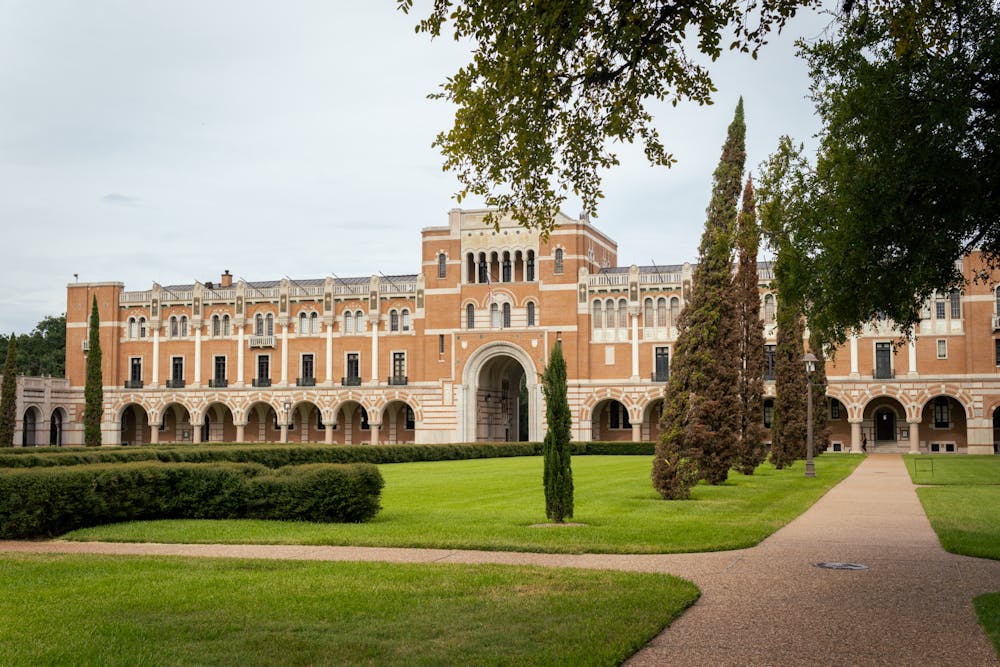Rice named as one of 16 schools in financial aid lawsuit

Gazi Fuad / Thresher
Rice is one of 16 universities alleged to have broken federal antitrust laws by violating the terms of an exemption which allowed universities to use a shared method of calculating applicants’ financial needs. The plaintiffs allege that this shared method resulted in price-fixing and unfairly limited aid to students, according to a lawsuit filed Sunday.
The complaint centers around the “568 Presidents Group,” a group of universities that developed a “Consensus Methodology” designed as “a set of common standards for determining the family's ability to pay for college.” Members of the group implement the agreed-upon formula each year to maintain a standard level of aid across admissions offers. This method allows universities to avoid financial aid bidding wars over low-income applicants who apply for financial aid, but, according to the lawsuit, increases the net cost of attendance for some students who might benefit from that bidding.
This process is legal under federal law. Section 568 of the Improving America’s Schools Act, after which the group is named, provides an antitrust exemption allowing universities to collaborate on their financial aid formulas. The exemption is only applicable if the schools agree not to consider an applicant's financial needs when deciding admission.
The complaint asserts that 16 members and former members of the 568 Group violated this exemption. Of the schools named, the complaint states “at least” nine schools failed to conduct need-blind admissions processes by “maintaining admissions systems that favor the children of wealthy past or potential future donors.” Additionally, a subset of these nine schools were alleged to have given preference to those who will not need financial aid when deciding which applicants to admit from the waitlist. Rice was not named as one of these nine schools.
According to the suit, the other seven schools, including Rice, “may or may not have adhered to need-blind admissions policies,” but did conspire to reduce financial aid and increase the net price of attendance. The complaint also states that these seven schools “knew or should have known that the other nine defendants were not following need-blind admissions policies.”
Rice declined to comment on the pending litigation.
While the complaint cites specific instances of admission officials from multiple schools acknowledging that applicants’ financial status was consulted during the admissions process, it mentions no such incident at Rice.
The only substantive references to Rice in the complaint are to note that the undergraduate population is “generally wealthy and privileged,” and the timing of Rice’s involvement in the 568 Group. Rice joined the group in 1998 and implemented the Consensus Methodology in 2003. They withdrew from the group in 2009 before joining again in 2017 and have remained a member since then.
This lawsuit comes on the heels of Rice announcing a variety of financial aid programs, including The Rice Investment and the recent expansion of its loan-free financial aid offerings.
Undergraduate students who enrolled in and received need-based financial aid from any of the institutions during their years as a member of the 568 Group are eligible to sign on to the suit. According to the complaint, the number of eligible students is more than 170,000.
The suit seeks damages and a permanent end to the “defendants’ conspiratorial conduct” in an effort to “prevent future students from suffering the injury the ongoing conspiracy has inflicted.”
Aside from Rice, the other 15 schools named are Brown University, California Institute of Technology, University of Chicago, Columbia University, Cornell University, Dartmouth College, Duke University, Emory University, Georgetown University, Massachusetts Institute of Technology, Northwestern University, University of Notre Dame, University of Pennsylvania, Vanderbilt University and Yale University.
More from The Rice Thresher

Worth the wait: Andrew Thomas Huang practices patience
Andrew Thomas Huang says that patience is essential to being an artist. His proof? A film that has spent a decade in production, a career shaped by years in the music industry and a lifelong commitment to exploring queer identity and environmental themes — the kinds of stories, he said, that take time to tell right.

Andrew Thomas Huang puts visuals and identity to song
Houston is welcoming the Grammy-nominated figure behind the music videos of Björk and FKA twigs on June 27.

Live it up this summer with these Houston shows
Staying in Houston this summer and wondering how to make the most of your time? Fortunately, you're in luck, there's no shortage of amazing shows and performances happening around the city. From live music to ballet and everything in between, here are some events coming up this month and next!

Please note All comments are eligible for publication by The Rice Thresher.